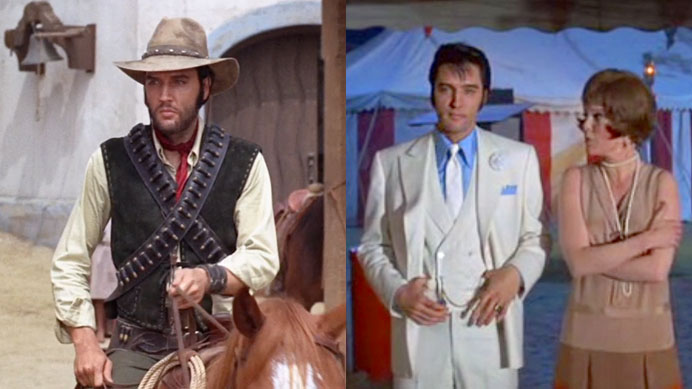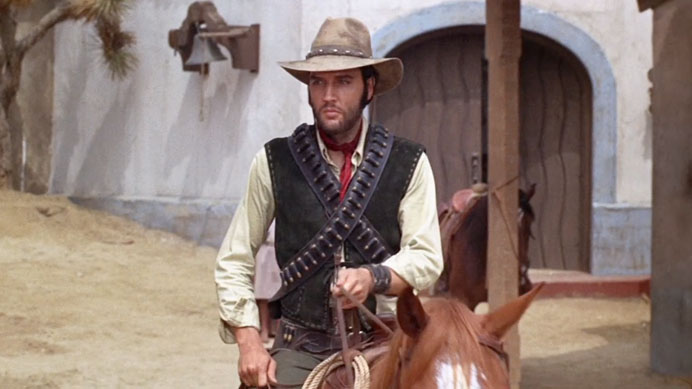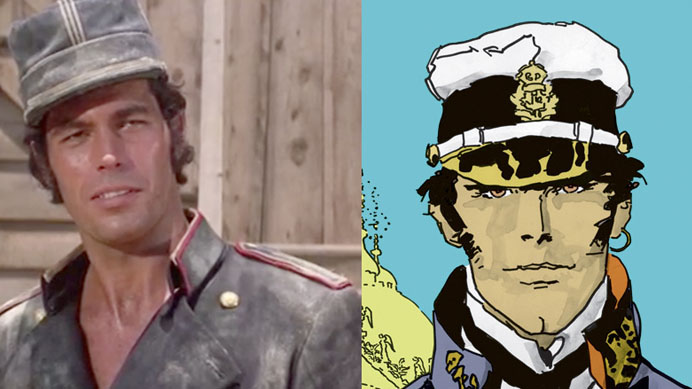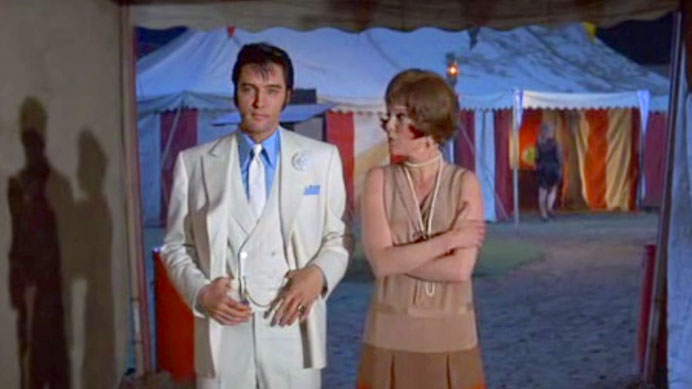
It’s the home stretch! After this post, I have only ONE Elvis movie left to go!
I’ve thus far neglected to really delve into the historical backdrop for these films—however, it is now 1969, and boy have we come a long way. When Elvis’ first film came out, in 1956, he was a mere 21 years old and had just debuted his “Hound Dog/ Don’t Be Cruel” single. Elsewhere in 1956, Norma Jean changed her name to Marilyn Monroe, Eisenhower got his second term, Grace Kelly became a princess, and the Supreme Court declared the Alabama Bus segregation laws illegal.
Now, in 1969, Nixon has become president, Neil Armstrong has taken one small step for man, Woodstock has burst onto the scene, The Beatles recorded Abbey Road, the Manson murders happened, and Don Draper had a zen moment on a California mountaintop.
Though the world has changed, Elvis has largely stayed the same—if you judged America solely by Elvis movies, you’d think we never made it past ’63. These last ones, however, are real wild cards:

Charro! (1969) | 98 min.
(Not to be confused with Charo.) I really wanted this one to be good, but like the majority of Elvis movies, it starts strong and only goes downhill from there.
Jess Wade (Elvis Presley) a hardened cowboy, rides into town and immediately gets caught in a set up—it’s his old criminal pal Vince Hackett (Victor French) and his gang of outlaws. They take him to their mountain hideout, where they divulge that they’ve stolen a gold-plated cannon that was used by Emperor Maximilian, a symbol of victory for Mexico and therefore a prized government possession. Vince tells Jess that there’s a bounty out for the man who stole it, and that man’s description mentions a neck wound and a name—dun dun dun—Jess Wade. Vince says this is Jess’ punishment for having left the gang. With the help of his screeching brother Billy Roy (Solomon Sturges) and the rest of the gang, they hold Jess down and stick a hot iron in his neck.
Left for dead, Jess manages to scrounge his way back to town where he immediately goes to old pal Sheriff Dan Ramsey (James Almanzar). The Sheriff believes he’s innocent, but says there’s not much he can do. Jess then checks up on his old flame Tracy (Ina Balin) a cancan dancer at the saloon. He tries to talk to her in her room but she doesn’t think he’s innocent at all (though she does give him his old gun back). The dancing, however, attracts Billy Roy to the saloon where he, confronted by Jess, makes a scene, and shoots Sheriff Ramsey.
They lock Billy Roy up and he spends his time screeching and acting like the most cliché ‘crazy’ person in the world. Eventually, the outlaws roll in and demand Billy Roy be released, but Jess refuses. Victor retreats for now, but decides to test out the cannon on an entire troop of Mexican soldiers. He blows them to hell after leading them into a shallow lake—looks like the cannon works. The town is the next target, and Vince orders them to shoot cannon balls at the town center until Billy Roy is let go.
The sheriff’s wife Sara (Barbara Werle) begs Jess to let him out—she’s worried about the health and wellbeing of the townsfolk and her husband. But Jess refuses still. A cannon ball then hits the sheriff’s house and they really kill the shit out of the poor Sheriff—he was already shot and dying, and now he gets crushed by the house caving in. His wife flips out and rallies the town against Jess.
Jess, meanwhile, quietly removes Billy Roy and takes him up the mountain towards Vince. There’s a shoot out in the rocks (almost a callback to Love Me Tender) where Billy Roy gets killed and Jess captures Vince and takes him to Mexico for justice.
They were clearly trying to capitalize off of that Sergio Leone, Clint Eastwood magic—heck, they even brought in Leone collaborator Hugo Montenegro to do the soundtrack. However, this vision of the Wild West is so declawed and neutered that the only parallel that remains is Elvis’ squinting Eastwood-y eyes and grimaces. This could’ve been a badass movie about a man who’s unfairly marked for death and decides to take out all who wronged him before he’s caught. Instead, what you get is a plot that completely misses what’s interesting or fun about its own setup. The movie is also punctuated with violence that unfortunately is undermined by lazy and emotionless direction.
The terrible acting in this film also doesn’t help. Every character except for Elvis spends the entire time screeching—male, female, old, young, doesn’t matter. There is so much shrieking dialogue and unnecessary yelling that you lose respect for not only the characters but also the film. The Billy Roy character in particular is offensive in every possible way—I couldn’t wait for them to shoot him simply because Sturges’ acting was so horrendously over the top and terrible. I felt like everybody in this movie was told to “play it big” except for Elvis—or, perhaps he just had the wherewithal to play it natural in spite of how he was being directed.
Speaking of, Elvis is once again the best actor in the film—he actually does a great Eastwood impression, and if he had had better dialogue or more badassery, he could’ve easily been a bandit legend. Elvis always played the reformed criminal well—Jailhouse Rock, of course, being the epitome of this. More importantly, however, Elvis has grown a beard for this role, and it looks great. This is a solid beard, people—none of that stick-on shit. And he shot this movie in Arizona right after his comeback special, so he’s lookin’ fit as heck in general.
Perhaps I’m being hard on ol’ Charro!, but for some reason the pitfalls of this film, while not really any different than any of the others, seemed worse here due to the serious nature of the movie. Plus, director Charles Marquis Warren comes off as old fogyish, and the stink of outdatedness was the last thing Elvis’ film career needed.
P.S., Anybody else think the Mexican commander, played by Tony Young, looks like the spitting image of the Italian comic Corto Maltese?

Best Song: This is the first film in which Elvis did not sing on screen! Probably the only good directorial choice in the film—it wouldn’t have fit in at all. He does, however, sing over the credits. I also have to say, I hated the soundtrack—it felt like Hugo Montenegro’s dug around in his trash bin for these. It just came off as cheesy and atmospherically incorrect.
2 out of 5 Stars,
1 out of 5 Elvises


The Trouble with Girls (And How To Get Into It) (1969) | 97 min.
I’m gonna level with you, I have no idea what this movie was about.
Director Peter Tewksbury, coming fresh off that steaming pile Stay Away, Joe, brings us a proto-Altman flick about the lives of Iowan townsfolk in 1927 and a traveling Chautauqua that comes to town. What the hell is a Chautauqua, you might ask? Good question, because the film never really explains it. Some quick Googling lead me to find out that it was an adult-education movement—a sort of summer school for adults that masqueraded as a fair. Instead of freak shows and feats of strength, they had educated speakers and Christian instruction—aka, 1920s traveling TED talks.
So anyhow, this Chautauqua is managed by Walter Hale (Presley) who deals with a whole cast of characters: there’s his Union-obsessed theater teacher Charlene (Marlyn Mason) local single mother Nita (Sheree North) Nita’s daughter, Carol (Anissa Jones), her friend Willy (Pepe Brown), and local pharmacist/creep Wilby (Dabney Coleman) who’s blackmailing Nita into an affair, and Betty (Nicole Jaffe) the local desperate girl who keeps trying to seduce Walter.
An hour of back and forth between all of these characters (and more) happens, as the Chautauqua is being set up and people start to arrive to town. Notable talent shows up, from the entirety of The Met Opera singers to a pompous speaker named Mr. Morality (Vincent Price). Insert about forty minutes of children auditioning for talent shows, Charlene literally reciting labor code rules to Walter and accusing him of being a capitalist pig, Wilby coercing Nita, gambling, something about forcing Walter to cast the mayor’s daughter in a play, plus an incident with a box of fireworks and a carelessly tossed cigar.
Eventually the trouble starts when pharmacist Wilby is found dead in a pond and business starts to slow. One of the college kids from the fair gets arrested but claims he’s innocent. Walter somehow has a hunch and manages to corner Nita, saying that if she knew who the killer was he could promise not only a large sum of money to that person, but also a near guarantee of their freedom. Next thing you know, signs are going up around town that “the killer confesses live tonight”, which of course brings in droves of people. Nita, however, gets piss drunk and takes a long time to revive enough to do the confessing. In the end, somehow she does gets off, I guess because it was self defense? Walter calls himself a hero for giving her the platform to defend herself, and Charlene quits over her indignation at his callousness. He then hands her four hundred dollars and gets some guys to kidnap her and put her back on the train with them before they head out of town.
This movie was boring as sin and I’m going to blame lame duck director Tewksbury. All of the jokes fell flat—was I supposed to be laughing at Charlene going on her rants about how Capitalism corrupts? As much as I might ideologically have agreed with her, she was about as interesting as reading a textbook. The concept of the film isn’t terrible—it’s essentially about corruption, from nepotism to murder, all on the backdrop of an ideological religious and educational experience. The biggest problem, however, was the lack of focus on any one character in the movie—it’s an ensemble cast of equally boring parts.
Elvis, however, is looking fly as hell again. He’s slim, got a white three-piece suit, slicked back hair with some tousled bangs, and sideburns the size of Texas—just like I like him. Unfortunately, there’s like barely any Elvis in this movie, which really leaves me in an Elvis rating dilemma because he is dressed in some beautifully tailored clothing and singing some genuinely great numbers (when he’s not sexually harassing his female employees). But, if I were to guess, I’d say there’s really only about 30 minutes of Elvis screen time in the whole film. I don’t know why they thought anybody seeing this movie was coming for anything other than Elvis—nobody else in the movie is actually interesting. Though, there is a regular ol’ who’s-who of ‘60s cinema: you’ve got Marlyn Mason, John Carradine, Anthony Teague, Nicole Jaffe (aka Velma on Scooby Doo) and the aforementioned frickin’ Vincent Price, to name a few.
All in all, this was a weird one. I unfortunately cannot say it’s worth watching on its own, though it’s certainly a departure for Elvis and his career thus far. And I have no idea why the hell they chose that title for this movie—the logic is beyond me, unless it’s just to imply that women be murderin’ when you’re a blackmailing harasser.
Best Song: “Clean Up Your Own Backyard,” a smooth, funky, gospel-inspired number that reminds you how country music can be fantastic. Unfortunately the sequence is shot in what can only be described as Stupid Camera Tricks style—,they do this earlier on in the movie too with a bluegrass number and it’s just as nauseating. Elvis only has two and a half musical numbers in this one, and the other is just straight up gospel. It’s worth a listen, why not—we only got one more Elvis movie to go!
1 1/2 out of 5 Stars,
3 out of 5 Elvises



Back to Jenna Does Elvis #14 | Forward to Jenna Does Elvis#16
Yes,, you are right about Charro, although I do like Sturgess` acting, it`s over the top but he is meant to be psychotic so you would expect something a bit big and bold acting wise,bearing in mind the Manson murders, a good reflection of the times. Over here in UK, the younger alternate anarchic scene audiences would have understood where the character was coming from. Trust me I`ve met a few worse than Billy Roy for real.
One of my favourite scenes is the one where Vince Hackett punches two of the gang members out in a squable by their camp fire. I call it a “VICTOR FRENCH”. So when ever I`m gonna get involved in a fight, I now say I`m gonna Victor French him.
I actually got a copy on DVD recently, it was dubbed from a really bad grindhouse cinema style print, all scratchy lines and jumpy, it gave the movie a cool late night cult-ish feel. Just needed some slightly out of sync bad voice over dubbing to give it the full Spaghetti feel.
It would be worth a remake maybe, as seems the current trend, maybe use a black actor in Elvis` role(DJango style) and make Billy Roy a gay psychotic who has an eye for Jess Wade, that would juice it up.
I should have been a film director.
As for The Trouble with Girls, I like it because it had a certain charm being set in the 20`S, Elvis looked amazing and played the part excellently, I think every woman would of wanted him as their boss even if he was a bit tricky. I had a crush on Marlyn Mason when I first saw this movie, it didn`t get a general release in the UK, so I had to wait 5 years before it was on UK national TV. I had that “rinky dinky do” theme using the “Almost” song as an instrumental incidental music by the parade band stuck in my head for weeks after.
It kinda made me thought the film was reminiscing on Colonel Parker`s days as carnival huckster, with Elvis dare I say it playing the colonel when he was younger,
indeed Edward Andrews character Johnny, could have been a pseudo Colonel too, look wise.
The songs were good, I even like the Chad Mitchell Trios “Hello Susan Brown” nice touch. Nice to see Elvis doing Gospel too, it was his favourite music, great job.
Again the film would have been a good pilot for a TV series as the comedy was not that intolerable and fairly sharp and with the moral overtones thrown in would have made good viewing and a great platform for new and established artists to make guest appearances each week, even Johnny Cash could have popped up on it, as he did in Columbo.
I should have been a TV producer.
I’m in the minority here but this is one of my five favorite Elvis films. First and most important – it’s a comedy that actually makes you laugh, there’s enough intelligence in the dialog to make it work (after so many abysmally unfunny EP movies, that certainly comes as a relief). (It even has a “funny song” that’s both funny and musically charming – Signs Of The Zodiac). And with so many sub-plots going on, the fact that he’s not the focal point all the way through (in fact, disappearing for much of the first half) is crucial to its success.
Other than the inappropriate title, the worst thing I can say about it is that Almost (a perfectly fine song) is 50% inaudible.
I was watching Charro for the first time and I really started to loose interest in the movie until the Mexican lieutenant appeared with his beautiful eyes and hair! And I immediately thought that he looked exactly like Corto Maltese! It’s so funny to me that you noticed the same thing! I’m sure Hugo Pratt had seen this movie, he was a huge western movies fan!
Also, Elvis is really one who acts the best in the whole movie! Honestly his look is very good and he really gave a lot of effort in the character. Unfortunately the writing of both the character and the plot, plus the awful performances of literally all the other actors didn’t help him.